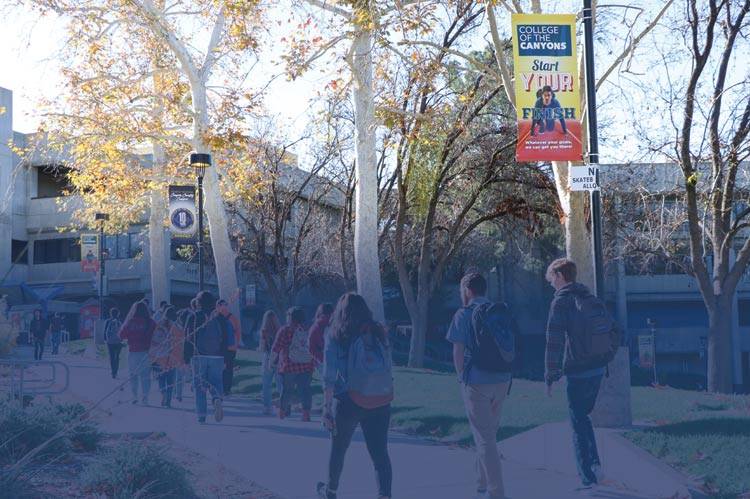Award Package and Overawards
In determining your need for aid from the student financial aid programs, we must first consider other aid you're expected to receive. This sometimes consists of veteran's benefits, EOPS or CARE Grants, National Service Trust and other educational benefits, such as outside scholarships. We then put together a financial aid package that comes as close as possible to meeting your financial need. However, because some funds are limited and available on a first-come, first-serve basis, the amount awarded to you may fall short of the amount for which you are eligible.
The following awards are listed in the Award Packaging Order:
- California College Promise Grant (BOG Enrollment Fee Waiver)
- Federal Pell Grant
- Supplemental Educational Opportunity Grant (SEOG)
- Cal Grant
- Student Success Completion Grant (SSCG)
- California Military Department GI Bill® Award Program (CNG)
- Chafee Grant
- EOPS/CARE
- Federal Workstudy (FWS)
- Scholarships & Educational Resources
- Stafford Loan - Subsidized (DLSUB)
- Stafford Loan - Unsubsidized (DLUNS)
- PLUS Loan (DLPLS)
Federal regulations require colleges to consider all educational financial assistance to be calculated in determining student eligibility. Financial assistance includes grants, loans, scholarships, fee waivers, gift cards/meal stipends, work study, specific Veteran educational benefits, and similar programs used to cover postsecondary educational expenses. When a student receives more aid than his/her financial need or our cost of attendance, the result may be an overaward.
Overawards must be resolved and may result in funds being returned to an aid program and a student owing College of the Canyons money.
College of the Canyons will not reduce or cancel Pell Grant, SEOG, Cal-Grant, CCPG or other need-based awards to eliminate an overaward situation. In most cases, student loans will be reduced or cancelled.
What is an overaward of financial aid?
When the total of all aid received by the student exceeds the student's cost of attendance budget, awards in the package will be adjusted (cancelled or reduced) in order to eliminate the overaward. Loans will be reduced before any reduction is made to any other awards.
Federal/State Regulatory Overaward Requirements
Federal and state need-based aid regulations stipulate that a student receiving federal or state need-based awards (see list below) cannot receive assistance (from any source) in excess of his/her financial need as determined by the analysis of the information submitted on the Free Application for Federal Student Aid (FAFSA).
What Is Financial Need?
For 2023-24 Award Year and before: Cost of Attendance (COA) minus Expected Family Contribution (EFC) = Financial Need.
For 2024-25 Award Year and after: Cost of Attendance (COA) minus Student Aid Index (SAI) minus Other Financial Assistance (OFA) = Financial Need.
- COA is established by the aid office in compliance with federal law.
- EFC is determined by the analysis of the information submitted on the FAFSA.
- SAI is determine by the analysis of the information submitted on the FAFSA. The SAI is a number used to determine eligibility for need-based aid. It is calculated using information that the student (and contributors, if required) provides on the FAFSA.
- OFA refers to the scholarships, grants, loans and other assistance known to the school at the time the student's aid was packaged.
Federal and state need-based awards include the following:
- Federal Pell Grant (Note: A Pell Grant can only be reduced or removed at the request of a student intending to hold the funds for transfer.)
- Federal Supplemental Educational Opportunity Grant (SEOG)
- Federal Work-Study
- Federal Direct Subsidized Loan
- Equal Opportunity Program & Services Grant (EOPS)
- Cal-Grant
- California College Promise Grant (CCPG)
Normally this means your student loans will be adjusted to eliminate the overaward situation. This adjustment of the awards is required by federal/state law if any of the above federal/state need-based awards are included in the student's financial aid package.
How do overawards occur?
Overawards are usually the result of the student receiving aid that the Financial Aid Office was not aware of when it completed the student's financial aid package and/or processed a loan application for the student. It is the student's responsibility to provide written documentation indicating additional resources to the Financial Aid Office. This should be done as soon as the student becomes aware that he or she will receive the aid. We must account for all sources of aid, even if they are not processed directly through our office.
Overawards can also result from application errors by the student or the Financial Aid Office. Regardless of the reason for the overaward, we are bound by Federal regulation to correct the overaward. Exceptions cannot be made for anyone.
Correcting an Overaward
Here are the steps that the Financial Aid Office will take to correct an overaward.
- We will determine whether or not the student has increased financial need that was not anticipated at the time of the award and/or loan application.
- If no increased need is demonstrated, and/or the student's total aid still exceeds his or her need, we will cancel any undisbursed loans and/or return loan funds to the lender if the disbursement has already been made. In cases of extreme gift aid, the institution reserves the right to adjust institutional or campus-based aid within the boundaries of Federal regulations.
- If the student has no loans or the student's aid still exceeds the student's need after all loans have been cancelled, we will reduce institutional grant and/or scholarship aid.
Information is subject to change without notice due to changes in federal, state and/or institutional rules and regulations. Students must complete a FAFSA every year. Students must be making satisfactory academic progress to continue to receive financial aid.

 My Canyons
My Canyons  Canvas
Canvas 
